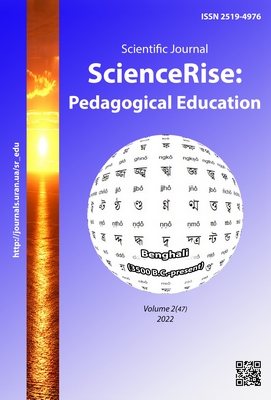Means of the future engineers-teachers’ professional competence formation: pedagogical and psychological conditions
DOI:
https://doi.org/10.15587/2519-4984.2022.254299Keywords:
professional-creative skills, motivation, pedagogical creativity, practical training, creative abilities, diligence, future engineers-teachersAbstract
The article considers the psychological and pedagogical conditions of the future engineers-teachers’ professional competence formation, pedagogical creativity as a component of pedagogical skills, as well as features of working with talented and gifted students as an important factor in effective professional development.
The psychological and pedagogical principles of linguistic activity of able and gifted students were studied. Scientific approaches to understanding of “ability” and “dedication” and their influence on language activity of non-philological specialties students are defined. The psychological and pedagogical principles of organization of interaction of the teacher and students were formulated.
Pedagogical psychology investigates the processes of development of students’ thinking, attention and memory, ability to perceive language facts and phenomena in their dialectical unity. For gifted students there are high enough development of thinking, long-term memorization of educational material, high efficiency, developed self-control skills in educational activity, ability to give doubt and scientific thinking certain stereotypes. They are distinguished by an increased propensity to mental activity, originality, the formation of different kinds of memory, respect, assembly, speed of reaction, richness of imagination.
For effective work with gifted students teachers have to know their psychological and pedagogical peculiarities and specifics of their learning, to be recognized with the concept of diligence, to understand the content of understanding “ability”, “dedication”, “talent”, types of diligence. It is important in the teaching of the future profession, that students are aware of their own activities, both theoretical and practical. The development of professional competence is the development of creative individuality, the formation of readiness to accept the new, the development of receptivity to pedagogical innovations
References
- Ball, H. O. (1996). Psykholohichni aspekty humanizatsii osvity. Kyiv – Rivne. 128.
- Sysoieva, S. O.; Ohnev’iuk V. O. et. al. (Eds.) (2015). Kompetentnisno zoriientovana vyshcha osvita: formuvannia naukovoho tezaurusu. Kompetentnisno zoriientovana osvita: yakisni vymiry. Kyiv: Kyivskyi un-t im. B. Hrinchenka, 18–45.
- Karpova, L. H. (2002). Sutnist profesiinoi pidhotovky vykladacha. Pedahohichna pidhotovka vykladachiv vyshchykh navchalnykh zakladiv. Kharkiv: OVS, 164.
- Lozova, V. I. (2002). Formuvannia pedahohichnoi kompetentnosti vykladachiv vyshchykh navchalnykh zakladiv osvity. Pedahohichna pidhotovka vyshchykh navchalnykh zakladiv. Kharkiv: OVS, 164.
- Basov, M. Ya.; Levchenko, E. V. (Ed.) (2007). Obshchye osnovi pedolohyy. Saint Petersburg: Aleteiia, 776.
- Klimov, E. A. (2011). Psikhologiia professionala. Moscow: Izd-vo Mosk. psikh.-sotc. in-ta; Voronezh: MODEK, 455.
- Zinchenko, V. P. (2005). Pedahohichni vminnia yak osnova formuvannia maisternosti. Pedahohichna maisternist: problemy, poshuky. Perspektyvy. Kyiv-Hlukhiv, 74–80.
- Kuzmina, N. V., Derkach, A. A. (1993). Akmeologiia: puti dostizheniia vershin professionalizma. Moscow: RAU, 140.
- Batyshev, S. Ia., Novikov, A. M. (Eds.) (2010). Professionalnaia pedagogika. Moscow: Assotciatciia «Professionalnoe obrazovanie», 456.
- Makhmutov, M. I. (1975). Problemnoe obuchenie. Osnovnye voprosy teorii. Moscow: Pedagogika, 158.
- Platonov, Iu. P. (2006). Put k liderstvu. Saint Petersburg: Rech, 348.
- Honcharenko, S. (1997). Ukrainskyi pedahohichnyi slovnyk. Kyiv: Lybid, 374.
- Pedahohichna maisternist uchytelia-vykhovatelia. Available at: https://pidru4niki.com/15660212/pedagogika/pedagogichna_maysternist_uchitelya-vihovatelya
- Sysoieva, S. O. (2006). Osnovy pedahohichnoi tvorchosti. Kyiv: Milenium, 346.
- Ziaziun, I. A., Kramushchenko, L. V., Kryvonos, I. F. et. al. (2008). Pedahohichna maisternist. Kyiv: SPD Bohdanova A. M., 376.
- Moliako, V. O., Muzyka, O. L. (Eds.) (2007). Zdibnosti, tvorchist, obdarovanist: teoriia, metodyka, rezultaty doslidzhen. Zhytomyr: Vyd-vo Ruta, 320.
- Talyzina, N. F. (2001). Pedagogichesaia psikhologiia. Moscow: Izdatelskii tcentr «Akademiia», 288.
- Krushelnytska, Ya. V. (2000). Fiziolohiia i psykholohiia pratsi. Kyiv: KNEU, 232.
- Stepanov, O. M. (2006). Psykholohichna entsyklopediia. Kyiv: Akademvydav, 424.
- Kuzminskyi, A. I., Omelianenko, S. V. (2010). Tekhnolohiia i tekhnika shkilnoho uroku. Kyiv: Znannia, 335.
- Antciferova, L. I. (2006). Razvitie lichnosti i problemy gerontopsikhologii. Moscow: Institut psikhologii RAN, 512.
- Andreev, V. I. (2015). Pedagogicheskaia evristika dlia tvorcheskogo samorazvitiia mnogomernogo myshleniia i mudrosti. Kazan: TcIT, 288.
- Kolinets, H. H. (2010). Psykholohichni peredumovy formuvannia matematychnykh doslidnytskykh zdibnostei u shkoliariv. Aktualni problemy psykholohii, 12 (9), 164‒171.
- Pylypchuk, M. I. (2007). Osnovy naukovykh doslidzhen. Kyiv: Znannia, 270.
- Rubіnshtein, S. L. (2000). Osnovi zagalnoi psikhologіi. Saint Petersburg: Izdatelstvo "Piter". Available at: http://psylib.org.ua/books/rubin01/index.htm
- Yahupov, V. V. (2002). Pedahohika. Kyiv: Lybid, 560.
Downloads
Published
How to Cite
Issue
Section
License
Copyright (c) 2022 Viktoriia Zinchenko, Hanna Udovichenko

This work is licensed under a Creative Commons Attribution 4.0 International License.
Our journal abides by the Creative Commons CC BY copyright rights and permissions for open access journals.
Authors, who are published in this journal, agree to the following conditions:
1. The authors reserve the right to authorship of the work and pass the first publication right of this work to the journal under the terms of a Creative Commons CC BY, which allows others to freely distribute the published research with the obligatory reference to the authors of the original work and the first publication of the work in this journal.
2. The authors have the right to conclude separate supplement agreements that relate to non-exclusive work distribution in the form in which it has been published by the journal (for example, to upload the work to the online storage of the journal or publish it as part of a monograph), provided that the reference to the first publication of the work in this journal is included.







